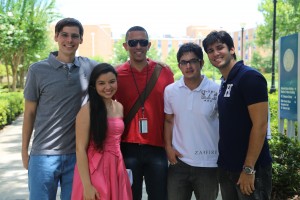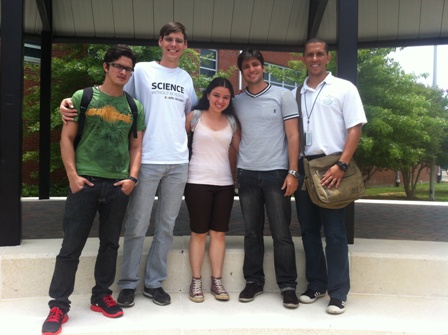Jackson State University recently welcomed five undergraduate students from Brazil through the government initiated HBCU-Brazilian Alliance that aims to break the social and economic barriers for Afro-Brazilian students.
 This alliance supports the U.S.-Brazil Joint Action Plan on Racial Equality, which promotes and expands academic exchange opportunities between U.S. Historically Black Colleges and Universities (HBCUs) and Brazilian universities.
This alliance supports the U.S.-Brazil Joint Action Plan on Racial Equality, which promotes and expands academic exchange opportunities between U.S. Historically Black Colleges and Universities (HBCUs) and Brazilian universities.
The program creates a once-in-a-lifetime opportunity for Brazilian students who major in the science, technology, engineering and mathematics (STEM) disciplines.
“In Brazil, international experience is highly appreciated,” says biology major Brenda Cavalcante Matos. “The job market in Brazil is very competitive but we are sure we will get a good job.”
The students are all thrilled about their hands-on educational opportunity at JSU. They will spend a year at the university.
“I’m grateful for the opportunity to use better labs than those in Brazil,” says Anderson Clemente Cazita, an electrical engineering major.
Great educational opportunities were not the only expectation of the Brazilian group. They all expressed a desire to connect with new people and experience the culture the American South.
The group said they’re impressed by the welcome they’ve received at JSU.
“The people here are very hospitable,” said electrical engineering major Cristovam Andre Trocoli de Moura.
“It is unusual. People here talk with us. They are so patient,” says Clemente Cazita.
“People speak very fast here,” says Cavalcante Matos. “Southern vernacular is a culture shock.”
The language was not the only surprise.
“Eggs and bacon for breakfast is totally uncommon,” says Clemente Cazita.
Cavalcante Matos agreed, noting that they were not accustomed to cheeseburgers either.
Brazil hosts the largest number of people of African descent in the Western Hemisphere, but these Brazilian students, all of African descent, were stunned at the differences of American and Brazilian culture as it relates to those of African descent.
“There are many different ethnic groups,” says Matheus Do Nascimento, a telecommunications engineering major. “It’s common for the blacks to marry whites.”
“There are no ethnic definitions,” says Clemente Cazita. “Everyone is Brazilian. It’s even common to have different skin tones within the same family.”
“Yeah, we are equal. Ethnicity is not important in our country,” says Do Nascimento.
Brazilians separate themselves by social classes.
“We never had a separate neighborhood for whites or blacks,” says Clemente Cazita.
“You never see a university for black people or white people. The university is just public,” says Cavalcante Matos.
In regards to the HBCU-Brazilian Alliance initiative, the band of foreign students unanimously agreed that the program is important.
“I think the program will strengthen the networks between America and Brazil. When you know the culture of the people, it’s easier to make business and help more people,” says Clemente Cazita.
Flavio Jaime Pol Goncalves, an electrical engineering major agreed saying, “We want to make friends here.”
The excitement of being on U.S. soil sparked a desire in all of the students to one day return to America.
“I think this opened the door for us to come back,” says Cavalcante Matos. “The vision of this program is to knock down the barriers.”
Trocoli de Moura also expressed his plans to return to the United States. “I would like to start a family here,” he says.
-Darrell Robinson, Jr.








Though an exception to the popular unwritten rule, thanks for being a trendsetter in affording the fortunate Brazilians a hands-on positive indelible black American experience, which is difficult for many, some, or others to follow. -Anonymous Alumnus